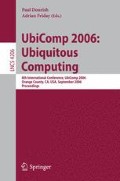Abstract
This paper reports on issues related to the use of mobile phones by women aged 60 years and over. The study started with a series of focus group discussions, which covered usage patterns, problems, benefits, ideal phone design, and desired and unwanted features. It then moved to an exploration of the group’s cooperative learning process when encountering an unfamiliar mobile phone. The issues raised in the discussions were translated into an online questionnaire, which was responded to by 67 women aged 60 and over. This study makes two main contributions to the field. First, it is one of a very few studies that provides a diagrammatic representation of older mobile phone female users’ cooperative learning process and strategies. Second, the study presents a combination of quantitative and qualitative data, which provides more nuanced interpretation and understanding of the use of mobile phones by older women.
Access this chapter
Tax calculation will be finalised at checkout
Purchases are for personal use only
Preview
Unable to display preview. Download preview PDF.
References
BBC News: Mobile users want cheaper calls (2004), http://news.bbc.co.uk/1/hi/technology/3656112.stm
BBC Wales News: Mobile use rise for over-65s (2003), http://news.bbc.co.uk/1/hi/wales/2802299.stm
Beck, L.L., Chizhik, A.W., McElroy, A.C.: Cooperative Learning Techniques in CS1: De-sign and Experimental Evaluation. In: SIGSE, St Louis, Missouri, pp. 470–474. ACM Press, New York (2005)
Bergel, M., Chadwick-Dias, A., Tullis, T.: Leveraging universal design in a financial services company. Accessibility and Computing 82, 18–24 (2005)
Bonsall, P., Stone, V., Stewart, J., Dix, M.: Consumer Behaviour and Pricing Structures: Final Report on Qualitative Research
Coates, H.: Mobile Phone Users: A Small-Scale Observational Study (2001), http://www.aber.ac.uk/media/Students/hec9901.html
Gibbs, A.: Focus Groups. Social Research Update 19. Department of Sociology, University of Surrey, Surrey, UK (1997), http://www.soc.surrey.ac.uk/sru/SRU19.html
Goss, J.D., Leinbach, T.R.: Focus groups as alternative research practice. Area 28(2), 115–123 (1996)
Honigsbaum, M.: Concern over rise of happy slapping craze. The Guardian (April 26, 2005), http://www.guardian.co.uk/mobile/article/0,2763,1470214,00.html
Irie, T., Matsunaga, K., Nagano, Y.: Universal Design Activities for Mobile Phone: Raku Raku PHONE. Fujitsu Scientific and Technical Journal 41(1), 78–85 (2005); (Special Issue on Universal Design)
Johnson, D.W., Johnson, R.T.: Instructional Goal Structure: Cooperative, Competitive, or Individualistic. Review of Educational Research 44(2), 213–240 (1974)
Johnson, R.T., Johnson, D.W., Stanne, M.: Comparison of Computer-Assisted Cooperative, Competitive and Individualistic Learning. American Educational Research Journal 23(1), 382–392 (1986)
Katz, J.E., Sukiyama, S.: Mobile phones as fashion statements: evidence from student surveys in the US and Japan. New Media & Society 8(2), 321–337 (2006)
Kitzinger, J.: Introducing focus groups. British Medical Journal 311, 299–302 (1995)
Kurniawan, S.H., Sutcliffe, A.G., Blenkhon, P.L.: How Blind Users Mental Models Affect Their Perceived Usability of an Unfamiliar Screen Reader. In: Proc. Interact, pp. 631–638. IOS Press, Amsterdam (2003)
Lankshear, A.J.: The use of focus groups in a study of attitudes to student nurse assessment. Journal of Advanced Nursing 18, 1986–1989 (1993)
Ling, R.: The Mobile Connection: the Cell Phones Impact on Society. Morgan Kaufmann, San Francisco (2004)
MacIntosh, J.: Focus groups in distance nursing education. Journal of Advanced Nursing 18, 1981–1985 (1981)
Melenhorst, A., Rogers, W.A., Caylor, E.C.: The Use of Communication Technologies by Older Adults: Exploring the Benefits from the Users Perspective. In: Proc. HFES 46th Annual Meeting, pp. 221–225. HFES Press (2001)
Mikkonen, M., Väyrynen, S., Ikonen, V., Heikkila, M.O.: User and Concept Studies as Tools in Developing Mobile Communication Services for the Elderly. Personal and Ubiquitous Computing 6, 113–124 (2002)
Mobile Media: Secufone keeps an eye on elderly, http://www.mobiledia.com/forum/topic16830.html
Mobile UK.: Mobile Phone and Everyday Life, http://www.theworkfoundation.com/research/isociety/MobileUK_main.jsp
Morgan, D.L., Kreuger, R.A.: When to use focus groups and why. In: Morgan, D.L. (ed.) Successful Focus Groups. Sage, London (1993)
Morgan, D.L.: Focus groups as qualitative research. Sage, London (1988)
NTT DoCoMo: Mobile phones increasingly popular among the elderly. Press Release 34(11), http://www.nttdocomo.com/files/presscenter/34_No11_Doc.pdf
Ofcom: Media Literacy Audit: Report on media literacy amongst older people. Ofcom’s Media Literacy Publications and Research (March 2006), http://www.ofcom.org.uk/ad-vice/media_literacy/medlitpub/medlitpubrss/older/older.pdf
Powell, R.A., Single, H.M.: Focus groups. International Journal of Quality in Health Care 8(5), 499–504 (1996)
Quadrello, T., Hurme, H., Menzinger, J., Smith, P.K., Veisson, M., Vidal, S., Westerback, S.: Grandparents use of new communication technologies in an European perspective. European Journal of Ageing (2005) doi:10.1007/s10433-005-0004-y
Ryan, S.D., Bordoloi, B., Harrison, D.A.: Acquiring Conceptual Data Modeling Skills: The Effect of Cooperative Leaning and Self-Efficacy on Learning Outcomes. The DATA BASE for Advances in Information Systems 31(4), 9–24 (2000)
Slavin, R.E.: Cooperative Learning: Theory, Research and Practice, 2nd edn. Prentice-Hall, Englewood Cliffs (1995)
Wellman, B.: Physical Place and CyberPlace: The rise of personalised Networking. International Journal of Urban and Regional Research 25, 227–252 (2001)
Ziefle, M., Bay, S.: How older adults meet complexity: aging effects on the usability of different mobile phones. Behaviour & Information Technology 24(5), 375–389 (2005)
Ziefle, M., Bay, S.: Mental models of a cellular phone menu. Comparing older and younger novice users. In: Dunlop, M.D. (ed.) Mobile HCI 2004. LNCS, vol. 3160, pp. 25–37. Springer, Heidelberg (2004)
Author information
Authors and Affiliations
Editor information
Editors and Affiliations
Rights and permissions
Copyright information
© 2006 Springer-Verlag Berlin Heidelberg
About this paper
Cite this paper
Kurniawan, S. (2006). An Exploratory Study of How Older Women Use Mobile Phones. In: Dourish, P., Friday, A. (eds) UbiComp 2006: Ubiquitous Computing. UbiComp 2006. Lecture Notes in Computer Science, vol 4206. Springer, Berlin, Heidelberg. https://doi.org/10.1007/11853565_7
Download citation
DOI: https://doi.org/10.1007/11853565_7
Publisher Name: Springer, Berlin, Heidelberg
Print ISBN: 978-3-540-39634-5
Online ISBN: 978-3-540-39635-2
eBook Packages: Computer ScienceComputer Science (R0)

